Composting as a method for soil regeneration
Composting as a method for soil regeneration
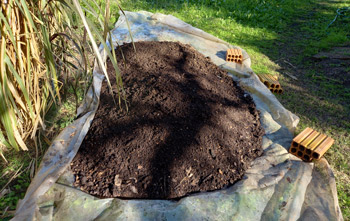
The plant kingdom has always been degraded and outraged by the chemical procedures that man uses to speed up natural processes. Composting, a very simple process that generates humus as a natural fertilizer, is a way to collaborate in the natural regeneration of the soil and restore the balance in nature.
Composting is the process of transformation of organic materials, through the activity of microorganisms, to obtain compost, a natural fertilizer. This process can be anaerobic (without oxygen) or aerobic (with oxygen), the latter being the fastest method used in the Community. Thermophilic bacteria take part in the process, during which the temperature begins to increase due to the heat generated in the biological oxidations, and then producing, after several phases, the elimination of pathogenic agents and material rich in nutrients for the soil.
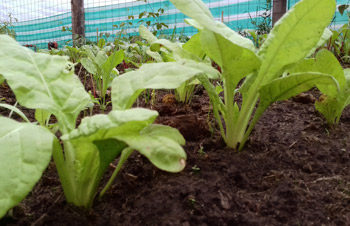 In the Light-Community Fraternity of Aurora, this method has been carried out for some years as part of the proposal to take care of the Kingdoms of Nature and as a support to both the agroforestry system and plantations. "In the past, these lands were cultivated over the years using toxic agrochemicals that destroy the natural soil fungi and microorganisms that are extremely important in the process of mineral absorption carried out by plants. The chemicals destroy the life of soil, make it acid, cause many problems and destroy the natural soil humus", comments William, responsible for the compost production in the Light-Community.
In the Light-Community Fraternity of Aurora, this method has been carried out for some years as part of the proposal to take care of the Kingdoms of Nature and as a support to both the agroforestry system and plantations. "In the past, these lands were cultivated over the years using toxic agrochemicals that destroy the natural soil fungi and microorganisms that are extremely important in the process of mineral absorption carried out by plants. The chemicals destroy the life of soil, make it acid, cause many problems and destroy the natural soil humus", comments William, responsible for the compost production in the Light-Community.
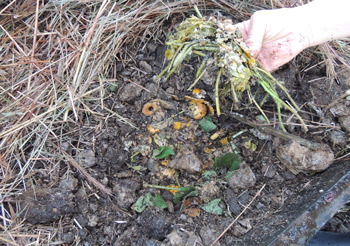 "We try to carry out organic agriculture, so all the waste that the kitchen produces is placed in containers that are taken to the composting area. We also recycle the excrement from the animals under the Community's care, such as horses, cows, and chickens, and we use all kinds of plant material from the gardens and vegetable gardens," William continues, explaining that small amounts of ash, calcium, and rock dust are also used to produce an organic material rich in minerals.
"We try to carry out organic agriculture, so all the waste that the kitchen produces is placed in containers that are taken to the composting area. We also recycle the excrement from the animals under the Community's care, such as horses, cows, and chickens, and we use all kinds of plant material from the gardens and vegetable gardens," William continues, explaining that small amounts of ash, calcium, and rock dust are also used to produce an organic material rich in minerals.
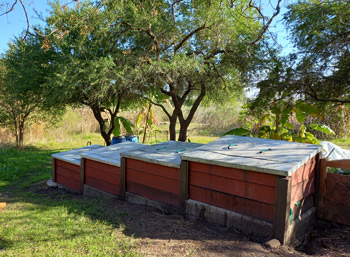 In the Redención 2 area, a special container has been manufactured for the composting process, which is made up of four wooden boxes with removable sides and placed in rows on a steep concrete base. The material collected for the composting process is placed in the first box and roughly every 2 weeks, the material is transferred to the second box through the gates. This organic material that has started to ferment in the other boxes is also transferred to the boxes next to it, transforming it into natural compost, which releases a highly nutritious liquid that is collected in containers due to the slight tilting of the structure.
In the Redención 2 area, a special container has been manufactured for the composting process, which is made up of four wooden boxes with removable sides and placed in rows on a steep concrete base. The material collected for the composting process is placed in the first box and roughly every 2 weeks, the material is transferred to the second box through the gates. This organic material that has started to ferment in the other boxes is also transferred to the boxes next to it, transforming it into natural compost, which releases a highly nutritious liquid that is collected in containers due to the slight tilting of the structure.
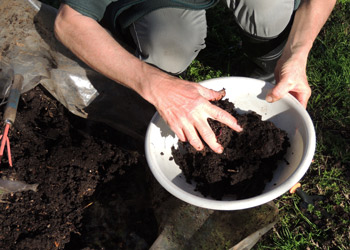
William further clarifies, "The decomposition process takes about 3 months, but we speed it up by stirring the compost carefully several times, cutting down the decomposition time." Finally, in the last compartment, some earthworms speed up and complete the humus production process.
From day to day, the Light-Community ventures into different methods aimed at improving the environmental balance. While the inorganic waste produced in the Community is duly sorted and sent for recycling, the organic waste is sent to the composting area to fulfill the normal biological cycle of nature.
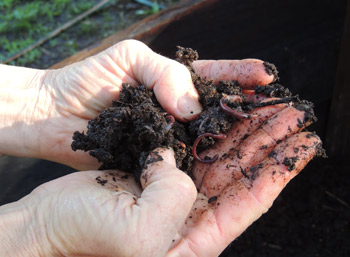 “"It is perhaps by far the most basic way to minimize the waste we produce every day, turning it into a soil fertilizer," says William, encouraging readers to do it at home and contribute this way to the care the plant kingdom so badly needs: "I have seen the most stunning gardens, and they always have the soil foundation built with vermiculture or composting. There are very cheap and easy ways to build your worm farm or compost bin. Like everything else, if you conscientiously look after and maintain them, they will not cause any odor problems nor should you have any difficulties recycling your organic material and transforming it into fertilizer for your plants. It is all just a matter of being encouraged."
“"It is perhaps by far the most basic way to minimize the waste we produce every day, turning it into a soil fertilizer," says William, encouraging readers to do it at home and contribute this way to the care the plant kingdom so badly needs: "I have seen the most stunning gardens, and they always have the soil foundation built with vermiculture or composting. There are very cheap and easy ways to build your worm farm or compost bin. Like everything else, if you conscientiously look after and maintain them, they will not cause any odor problems nor should you have any difficulties recycling your organic material and transforming it into fertilizer for your plants. It is all just a matter of being encouraged."
